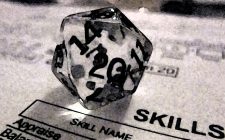If you’re a new GM, you may read through all the rules of whatever system you’re planning to play and yet still feel unready or wonder what the best way to GM is. If this is the case, let me give you a few pieces of advice.
There is no one right way to GM
Different things work for different groups. Focus on figuring out what works for you and your group. There are a wide variety of resources out there modelling and discussing different approaches to GMing. Maybe you’re great at accents and acting and want a game where roleplaying takes center stage. Maybe you’re terrible at acting in-character, but great at developing intricate plots or planning strategically interesting combats. Maybe you’re horrible at advance planning and just want to wing it. Maybe you don’t know what your strengths are yet, but you simply enjoy some things more than others. Figure out what you want your game to be and look for ways to help you achieve that vision. Jettison any advice that doesn’t work for you, no matter how well it works in someone else’s game.
Focus on fun
Depending on your group, fun may mean social bonding over food, deeply immersive role playing, challenging tactics, groan-worthy puns, etc. Figure out what things are fun for you and your players, but keep in mind that those things are means to an end. The goal is to have fun and the game is a way to do that. Don’t get so caught up on playing correctly that you forget to have fun at the table. And always be on the lookout for ways to add more fun, whatever that means to you and your group.
Be the host
A GM fills a lot of different roles. You may be the referee, imagineer, director, opposing team, and so on. However, if you have to choose one role to focus on, I’d recommend focusing on being a good host. Invite a good mix of guests. Welcome them when they arrive. Set the tone. Get people interacting with each other. Move things along from activity to activity. Make sure no one is left out or having unmet needs. Don’t let troublesome guests ruin the party for everyone else. Conclude gracefully. This is all Emily Post stuff, and books on being a party host will have great advice.
Communicate with the players
Tell them about what you want out of a game. Listen to what they say they want. Try to understand your players, their personalities and what they’re looking for in a game. If your players give you feedback, listen and try to learn from it. Even if you think they’re wrong, don’t reflexively argue; try to understand their perspective. Communicate about the small things, too. Remind them when a session is coming up and ask for replies to make sure they’re still joining in.
Realize that everyone makes mistakes
You’re not going to do a perfect job. Some sessions will be better than others, and even your best session will be imperfect. Accept this. Your goal is not perfection, but fun. Keep in mind that your players want to enjoy the game, so they want you to succeed. They’re not eagerly waiting to grade you harshly for your mistakes. They’re either your friends or want to be your friends and are rooting for you to succeed and will do what they can to help you.
Be willing to walk away
This may sound weird, but it’s my favorite advice from my favorite GM (and husband). The idea is that some people get so desperate to have an RPG group that they’re willing to not have fun, just to know that they’re doing it. They may accept obnoxious players, run a system they dislike, work themselves to death trying to meet expectations, or meet in places that makes them uncomfortable. Whatever the details, they settle for an experience they don’t really enjoy. But if you run a group knowing that you can walk away if it isn’t working, then it’s easier to know when you need to have a hard talk to your group about what needs to change, whether that means changing behavior, location, system, etc.
Anyway, those are my top bits of system-agnostic, GM advice. Is there anything you’d add? If so, feel free to include it in the comments below.




Not a GM, of course, but as with any creative endeavor, it’s probably a good idea to maintain one or more additional outlets of creative inspiration or expression. So read a book (for fun) every once in a while or take up fiction writing yourself.